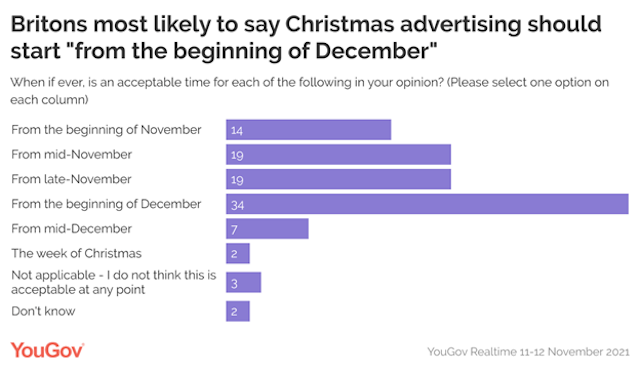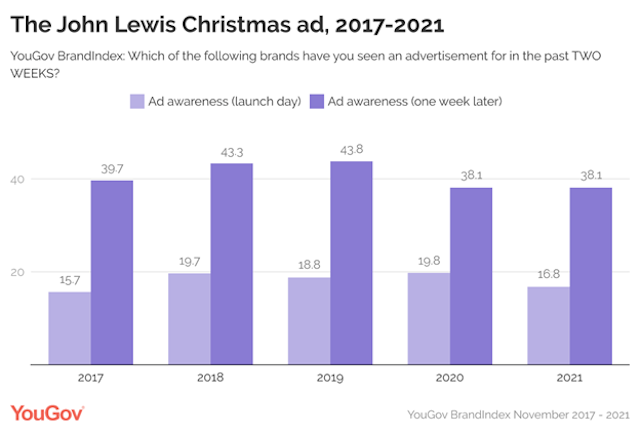Are early Christmas ads more effective?
Julian Newby, sector head of agencies and media at YouGov, explores why Christmas ads are coming earlier each year – and whether it’s a good idea.

This year’s John Lewis advert ‘An Unexpected Guest’ was released on November 4
It’s mid-November, which means we’ve already seen a flurry of Christmas ads from Boots, Aldi, Marks & Spencer, McDonald’s and, of course, John Lewis – among others. Some retailers, perhaps in a bid to get a jump on the competition, even launched their ads close to the beginning of November – a move that comes despite concerns in some quarters that festive ads are a dying form.
Whether they’re dying or not, data from YouGov RealTime shows that just over half of Britons (52%) think it’s acceptable to start airing Christmas ads in November – though significant proportions of this group would prefer if they began in late November (19%) or mid-November (19%), with 14% saying it’s acceptable to broadcast them at the beginning of the month.

Over two-thirds (43%) think it’s acceptable to air Christmas ads from December, with a third (34%) saying it’s acceptable to air them from the beginning of the month, 7% saying it’s okay to air them from mid-December, and 2% who want to see them on Christmas week (and not before).
John Lewis, of course, aired its Christmas ad on November 4 – earlier than it has at any point over the last four years. So how did this year’s ad perform compared to its predecessors?

Looking at the launch of the John Lewis Christmas ad using YouGov BrandIndex shows that, since 2017, it has led to considerable jumps in the brand’s Ad Awareness scores – a measure of whether the public has seen an advertisement for a brand in the previous two weeks – in the first week after launch. The 2021 ad, ‘An Unexpected Guest,’ performed comparably to last year’s ad: one week after their first airing, both commercials led John Lewis to scores of 38.1. With an initial launch day score of 16.8 compared to 2020’s 19.8, this year’s edition can even be said to have (slightly) outperformed the 2020 spot.
In the broader context of John Lewis’s last five Christmas ads, though, it’s a less remarkable performer, particularly in comparison to 2019’s ‘Excitable Edgar’ – which took Ad Awareness to 43.8 from an initial score of 18.8 (+25), or 2018’s Elton John-focused effort (where Ad Awareness rose from 19.7 to 43.3: an overall improvement of 23.6). Impression scores for John Lewis, which measure overall perception of a brand, also took a dive over the first week of this year’s campaign launch – falling from 50.5 to 44.2 (-6.3). This represents an underperformance compared to 2020, where scores improved from 49.5 to 51.1 (+1.6) and a significantly worse showing than 2019, where the (reluctantly) fire-breathing dragon boosted John Lewis’s scores from 50.8 to 57.7 (+6.9).
We could partially attribute this to the copyright issues around this particular ad, to Covid-19 (Christmas spending last year was down compared to the year before), to mild debate over the ad’s content or to broader fatigue with advertising in general. Data from YouGov Profiles shows that two-thirds of consumers (65%) say they feel “bombarded” by advertising, while two in five say ads are “a waste of time” (42%) or they “don’t trust the ads on TV” (42%). With this in mind, John Lewis choosing to start its festive season even earlier than usual could have been an ill-advised move. In any case, we can say definitively that Britons mostly do not prefer their Christmas ads at the start of the month – and we can also say that John Lewis’s Christmas ad this year has not yet had the effect of previous efforts.
